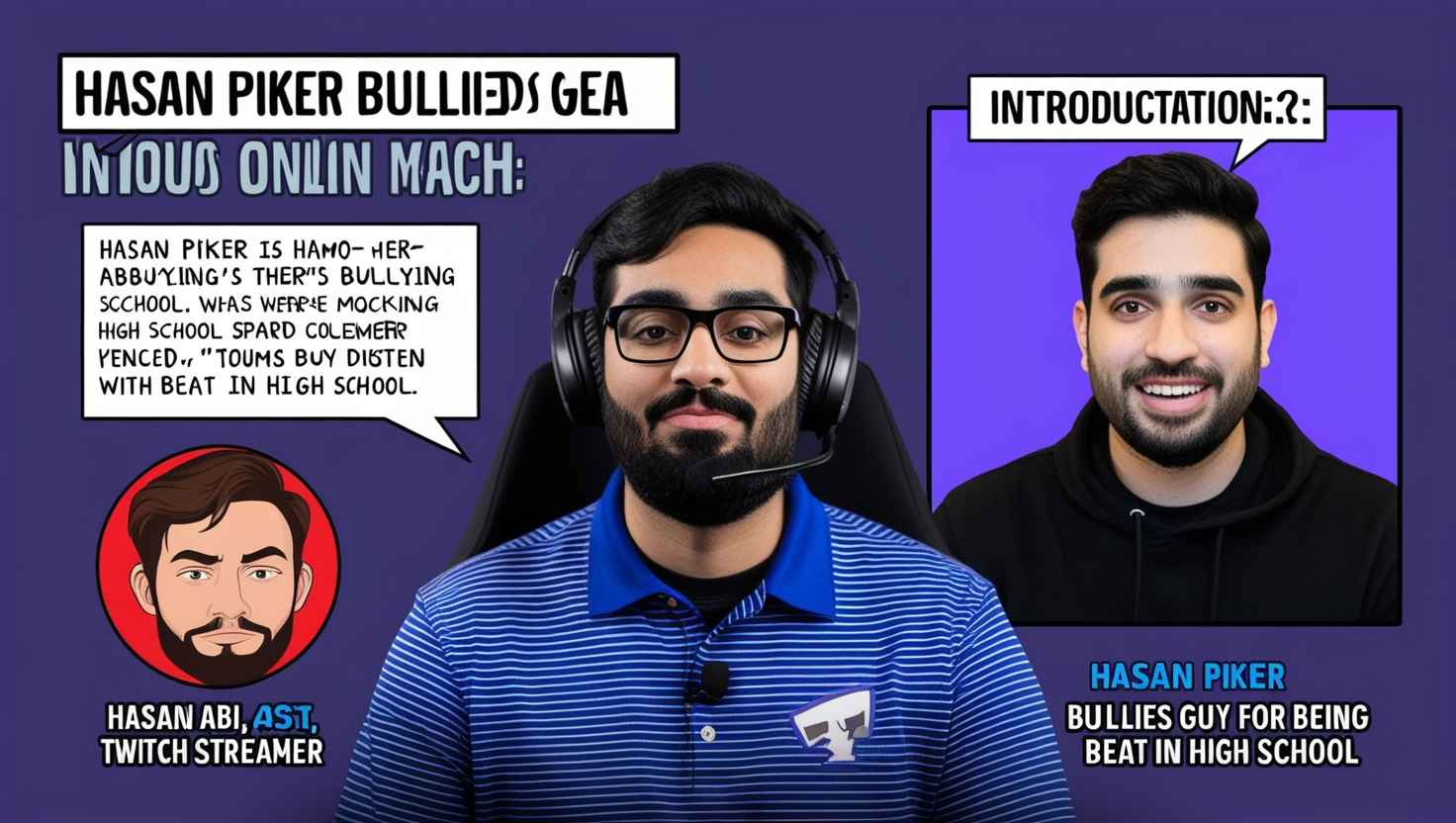Introduction
The incident involving Hasan Piker bullies guy for being beat in high school has sparked significant online debate, drawing attention to the responsibilities of public figures in sensitive conversations. During a livestream, HasanAbi, a popular Twitch streamer, made remarks about an individual’s experience of high school bullying, which many interpreted as dismissive or mocking. This interaction raised concerns about how trauma and personal stories are addressed in online spaces, especially by influencers with large audiences. The controversy highlights ongoing conversations about empathy, humor, and accountability in the digital age.
Hasan Piker Sparks Controversy
The phrase “Hasan Piker bullies guy for being beat in high school” has become a trending topic due to a heated livestream interaction. Piker, a Twitch streamer, mocked a viewer who shared a personal story about being bullied in high school. Critics argue that his comments trivialized the pain of bullying victims. This sparked debates about the responsibility of influencers in addressing sensitive topics. Piker’s defenders, however, claim his humor was misunderstood.
The Role of Humor in Hasan Piker’s Streams
In the context of “Hasan Piker bullies guy for being beat in high school,” Piker’s humor has come under fire. His style often includes sarcasm and bold commentary, which some view as entertaining while others consider insensitive. This incident reignited conversations about how humor should be used responsibly. Critics believe that mocking bullying survivors can cause further harm. Piker’s approach illustrates the fine line between satire and hurtful commentary.
Public Backlash and Hasan Piker’s Response
The phrase “Hasan Piker bullies guy for being beat in high school” gained traction as the internet reacted to his controversial comments. Many accused him of insensitivity, while others defended his right to speak freely. Piker later addressed the backlash, claiming his intentions were misinterpreted. The incident showcases public figures’ challenges when balancing authenticity and audience expectations. It also emphasizes the impact of online criticism on influencers.
Bullying Experiences in Online Discussions
The “Hasan Piker bullies guy for being beat in high school” controversy has highlighted how personal stories are treated in public forums. Sharing experiences of being bullied can be cathartic for some, but dismissive reactions may worsen emotional scars. Piker’s comments became a focal point for discussing empathy in digital spaces. This incident underscores the importance of creating a safe space for people to share their vulnerabilities.
Influencers and Their Impact on Social Issues
The phrase “Hasan Piker bullies guy for being beat in high school” raises questions about the influence of internet personalities on social issues. As someone with a large platform, Piker’s words carry significant weight. Critics argue that mocking such experiences downplays the seriousness of bullying. Supporters, however, see it as a joke taken out of context. The event emphasizes the need for influencers to be mindful of their impact.
The Internet Reacts to Hasan Piker
The “Hasan Piker bullies guy for being beat in high school” topic has triggered widespread online reactions. Social media users debated whether his comments were intentionally harmful or simply a failed attempt at humor. While some fans defended Piker, others called for greater accountability. This controversy reflects how the internet amplifies such incidents and creates polarized opinions. It also highlights the power of public discourse in shaping narratives.
Empathy and Accountability in Public Platforms
The incident involving “Hasan Piker bullies guy for being beat in high school” has spotlighted the need for empathy on public platforms. Critics argue that influencers like Piker must acknowledge the emotional weight of topics like bullying. Even when humor is involved, the impact on viewers cannot be ignored. This controversy serves as a reminder that words, especially from prominent figures, have consequences. Balancing entertainment and responsibility remains a challenge.
Debates on Free Speech Versus Sensitivity
The “Hasan Piker bullies guy for being beat in high school” debate touches on the tension between free speech and sensitivity. Supporters of Piker claim he should not be censored, as his humor reflects his personality. Critics, however, believe that jokes about traumatic experiences cross ethical boundaries. This event highlights the societal conflict over what is acceptable in public discourse. It challenges content creators to rethink their approach to sensitive topics.
The Evolution of Online Accountability
The phrase “Hasan Piker bullies guy for being beat in high school” represents how accountability in online spaces has evolved. Piker’s remarks faced immediate backlash, reflecting how quickly audiences react to controversial content. This incident showcases the shift toward demanding more responsibility from influencers. It also reveals how online communities serve as watchdogs, ensuring public figures are held to higher standards in addressing sensitive issues.
Lessons Learned from the Hasan Piker Incident
The “Hasan Piker bullies guy for being beat in high school” controversy offers valuable lessons about navigating public dialogue. It emphasizes the importance of considering the emotional impact of one’s words, particularly when addressing personal experiences. For Piker, this incident may serve as a learning moment in balancing humor with compassion. For audiences, it highlights the ongoing need for respectful discussions around sensitive topics in digital spaces.
Conclusion
The controversy surrounding Hasan Piker bullies guy for being beat in high school, highlights the complexities of online interactions and public discourse. This incident sheds light on the responsibilities of influencers when addressing sensitive topics such as bullying. While some viewed Hasan’s remarks as dismissive, others saw them as a failed attempt at humor. The situation underscores the importance of empathy, accountability, and thoughtful communication in the digital age. Ultimately, it serves as a reminder that words have power, and public figures must navigate their platforms carefully and intentionally.
READ MORE: itsoftedge.com
